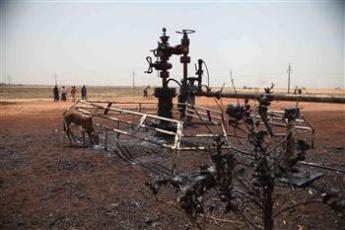Darfur threatens to scupper Sudan oil export ambitions
By Pieter Tesch, Lloyds List
LONDON, Apr 26, 2005 — Sudan’s ambitious plans to more than double crude oil exports in three years could come unstuck because of continued disputes in Darfur.
 The government expects newly discovered oil fields in the southern state of Darfur to produce 500,000 barrels of crude oil per day, while currently the country exports 300,000 bpd.
The government expects newly discovered oil fields in the southern state of Darfur to produce 500,000 barrels of crude oil per day, while currently the country exports 300,000 bpd.
But Darfur’s two main rebel groups, the Sudan Liberation Army and the Justice and Equality Movement, called on the Khartoum government to stop oil exploration until a resolution to ongoing conflict can be found.
The Sudanese government is also looking to double output of refined oil in three years after it awarded a $1.2bn contract to build a second refinery at Port Sudan, the country’s third, with a capacity of 100,000 bpd, to India’s state-owned Oil ‘ Natural Gas Corp.
One of the leading Sudanese companies involved in oil exploration in Darfur is Advanced Petroleum. Its president Salah Wahbi urged the Darfuri rebels to return to the negotiating table to speed up exploratory and field development work.
‘There is no need to fight. The people of Darfur will benefit from sharing the oil wealth locally under a future peace agreement. Why delay it by continuing to fight,’ Mr Wahbi told Lloyd’s List.
In the wake of the Comprehensive Peace Agreement with the Sudan People Liberation Movement, ending the 22-year-long civil war, the government signed a $400m deal on March 29 with ONGC and Malaysia’s Petronas to raise oil production by 80,000 bpd in March 2006 from the Thar Jath oil fields in the southern Unity state.
The government is keen to attract western companies again to work in Sudan, but disagreements have arisen with SPLM about the status of existing concessions and the granting of new ones.
SPLM is now described as the new ‘darling of the oil business’ after it emerged its own national oil company, Nile Petroleum Corp, was holding talks with international companies about developing oil fields that sit under land it controls.
In early March, shares in the newly-formed oil exploration company, White Nile, rose on the London Stock Exchange from 10p to 138.5p after news broke that the firm had signed a deal with the SPLM for block B in the south.
However, the Sudanese government said the deal was not valid, as it had renewed an existing agreement with French oil giant Total in December, before the signing of the CPA.
Mr Wahbi condemned the SPLM for unilaterally granting a concession to White Nile.
‘The deal between the SPLM and White Nile has no standing in international law as the CPA clearly states that all existing oil agreements supersedes the CPA.
‘Total has been paying the government rent and has renewed its agreement with the government in December.’
He did not believe that the disputes over the 50’50 share of the oil revenues between north and south would lead to a breakdown in the peace agreement.
But Mr Wahbi warned that the SPLM should realise it is part of the future government of Sudan and should act accordingly. Under the peace agreement, a commission will be set up to deal with such matters and the dispute over Block B.
The government is also inviting foreign investors to bid for concessions in the two offshore blocks in the Red Sea, block 13 and 15, respectively north and south of Port Sudan.
Initial exploration has confirmed the potential of large reserves of natural gas.
However it is understood that the government is not interested in exporting the gas as LNG, but to boost its oil exports by substituting domestic oil consumption with natural gas.
‘I don’t think Sudan could compete yet with other LNG exporters in the area, situated as we are between Egypt and Qatar, but we can free up more oil for export by substituting its use for domestic power generation with natural gas,’ said Mr Wahbi.
He pointed out that much of the diesel used for domestic power generation had to be imported, while natural gas could also be used in developing the Sudanese petro-chemical and fertiliser industries.
Mr Wahbi would like to see Sudan’s crude exports reach 700,000 bpd as then it would be appropriate to seek full Opec membership.
Currently the country has observer status.
So far only the ‘usual suspects’ like Petronas, ONGC and the China National Petroleum Company have declared an interest in the natural gas project.
